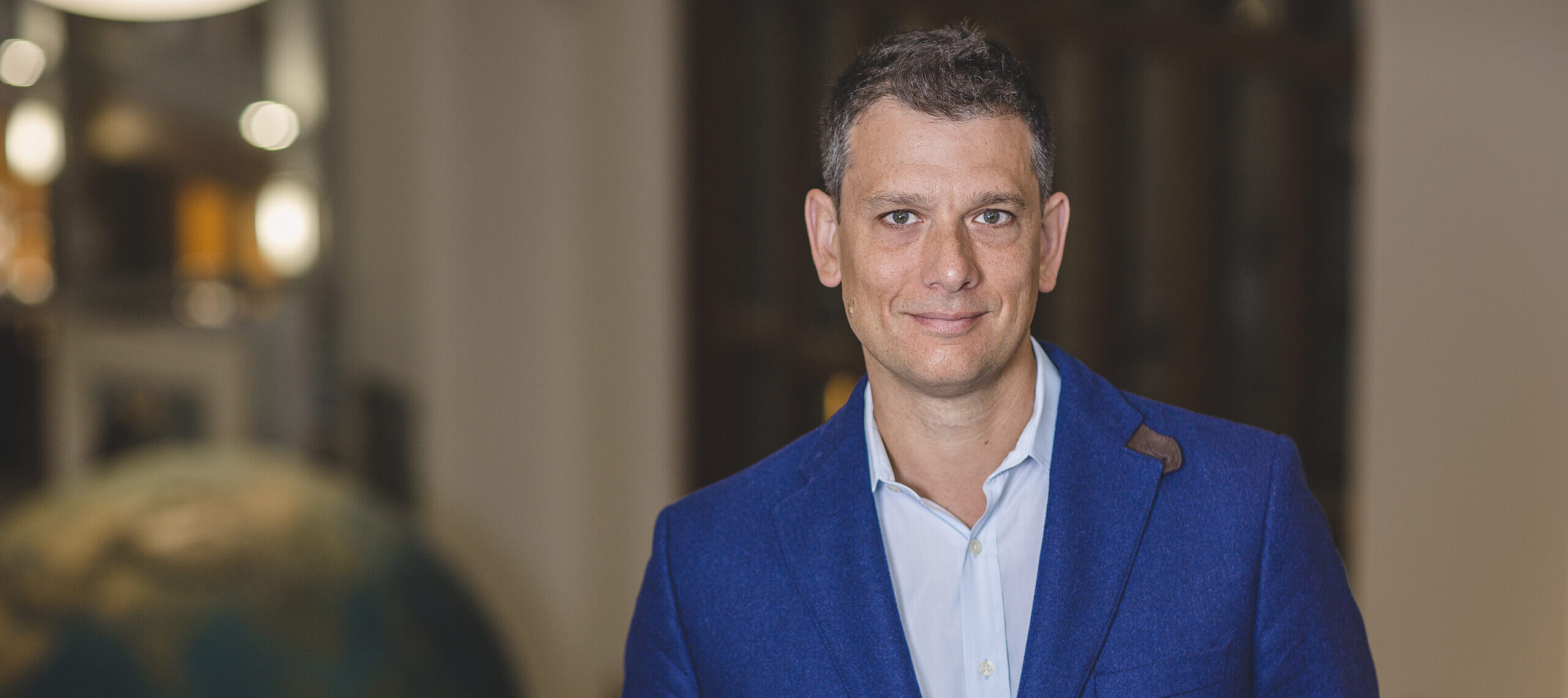New HMEI director Gabriel Vecchi aims to expand campus, community research and teaching partnerships
Gabriel Vecchi, professor of geosciences and the High Meadows Environmental Institute (HMEI), was named director of HMEI effective July 1. Vecchi succeeds Michael Celia, the Theodora Shelton Pitney Professor of Environmental Studies and professor of civil and environmental engineering, who had served as director since 2017.
“My experience at HMEI and Princeton has reinforced my view that HMEI is a world leader in environmental teaching and research,” said Vecchi, who focuses his research on climate science and modeling, particularly related to hurricanes and extreme weather. Vecchi joined the Princeton faculty in 2017 after serving as head of the climate variation and predictability group at NOAA’s Geophysical Fluid Dynamics Laboratory (GFDL) located on Princeton’s Forrestal Campus.
Before being named director of HMEI, Vecchi served as director of the Cooperative Institute for Modeling the Earth System — a collaboration between Princeton and GFDL — and he is a project lead within the HMEI Carbon Mitigation Initiative (CMI). Vecchi has been involved in both graduate and undergraduate initiatives based in HMEI, serving as faculty coordinator of the Princeton Energy and Climate Scholars (PECS) graduate student program and hosting undergraduate students through the Environmental Internship Program.
“HMEI has an amazing team and mission: the students who participate in classes and research are passionate and committed to understanding challenging topics, our faculty and scholars are outstanding, and the University is deeply committed to advancing environmental teaching and research,” Vecchi said. “In my view, it is clear that HMEI is in a really good position and on a great trajectory.”
HMEI has experienced significant growth both in areas of well-established strength — such as climate science and modeling, water, biogeochemistry, and biocomplexity — as well as growing initiatives related to the environmental humanities and climate change and infectious disease, Vecchi said. In recent years, the number of Princeton faculty with joint appointments in HMEI has more than doubled to include 17 faculty positions shared with the departments of civil and environmental engineering, mechanical and aerospace engineering, geosciences, ecology and evolutionary biology, English and anthropology, as well as the Program in American Studies, the Princeton Institute for International and Regional Studies (PIIRS), and the Princeton School of Public and International Affairs.
In October 2020, the University received a transformative gift from the High Meadows Foundation in support of environmental research and educational initiatives through HMEI, which resulted in a change in the institute’s name to HMEI from the Princeton Environmental Institute.
Supporting the expansion of HMEI’s research are several new programs, Vecchi said, including a graduate certificate in environmental studies and the Environmental Teaching Fellows program, which pairs environmental scholars with Princeton faculty mentors to participate in environmental research and teaching at the University. In addition, Princeton recently launched a new effort focused on biodiversity based in HMEI with support from the Thomas A. and Currie C. Barron Family Biodiversity Research Challenge Fund.
As director, Vecchi plans to expand on HMEI’s many collaborations with researchers and academic units across campus, and establish new partnerships, he said.
“One can imagine a connection between HMEI and practically any department on campus,” Vecchi said. “The next few years will bring opportunities to build on relationships with departments and programs with which we have historically strong connections, and also strengthen developing ties and seek new avenues of engagement.
“Interdisciplinary work is extremely valuable, but it is also challenging — it takes time, resources and commitment,” Vecchi continued. “I see HMEI’s role as having a strong and unwavering commitment to making the long-term investments necessary to build interdisciplinary excellence.”
The escalating environmental crises the planet faces reinforce the need for interdisciplinary solutions, which HMEI was founded in 1994 to foster, Vecchi said. Within the next few decades, he said, humanity will need innovative, large-scale and long-term solutions that address the effects of climate change, the loss of biodiversity, and the provision of food, water and energy to a growing human population.
To that end, HMEI programs such as Grand Challenges provide resources and other forms of support for interdisciplinary environmental research with an educational component, Vecchi said. Environmental studies courses such as ENV 200: “The Environmental Nexus” seek new ways to ingrain the breadth and complexity of environmental issues by addressing global crises from multiple perspectives.
The Net-Zero America Project, a landmark study released in December by researchers affiliated with HMEI and the Andlinger Center for Energy and the Environment, is “a great example of the practical outcomes that are needed to address pressing environmental problems,” Vecchi said.
“So many of the environmental challenges we face require interdisciplinary collaboration to understand them and to build solutions to address them,” he said. “HMEI recognizes this at its core, and provides a space for new ways to build the scholarship needed.”
Vecchi also hopes to expand HMEI’s work and engagement with community partners including organizations such as The Watershed Institute in Hopewell, New Jersey, which advances scientific research, education, conservation and advocacy focused on regional environmental concerns, especially water.
“New Jersey is rich in diverse environments and uses of those environments,” Vecchi said. “We are the most densely populated state, but we truly are the Garden State and one can still find idyllic natural spaces. This rich tapestry gives us a great opportunity to use an enhanced local focus to help us better understand and address global issues.”




